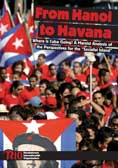




 When the guerilla assumed power, its program was based on the utopian vision of an independent Cuban capitalism, including a land reform to give land to poor peasants and decrease US influence in agriculture. Castro famously declared that the revolution was “not red but olive green” and in a visit to the United States in April 1959, he went even further: “I have said clearly and definitively that we are not communists. The doors are open to private investments that contribute to the development of industry in Cuba. It is absolutely impossible for us to make progress if we don’t reach an understanding with the USA.”[7]
When the guerilla assumed power, its program was based on the utopian vision of an independent Cuban capitalism, including a land reform to give land to poor peasants and decrease US influence in agriculture. Castro famously declared that the revolution was “not red but olive green” and in a visit to the United States in April 1959, he went even further: “I have said clearly and definitively that we are not communists. The doors are open to private investments that contribute to the development of industry in Cuba. It is absolutely impossible for us to make progress if we don’t reach an understanding with the USA.”[7]
The Castro regime had no option but to implement a land reform – otherwise it would have lost its base of support amongst the peasants. The reform passed in May 1959 was moderate in the sense that it offered generous compensation to former landowners. But US imperialism, unable to accept any steps towards increased independence by its de facto Caribbean colony, demanded the immediate payment of compensation, which was of course impossible for the impoverished Cuban state.
The new Cuban leadership was attempting a balancing act between imperialist and local capitalists on the one hand and the workers and peasants on the other. For example, throughout 1959 the M-26-J moved against the Cuban Stalinist Party, the People’s Socialist Party (PSP), and denounced them as “anti-revolutionary” for organizing strikes for better wages[8]. Playing the different classes off each other, the central leadership and especially Castro as the “líder máximo” concentrated more and more authority in their own hands.
In the end, this balancing act proved impossible since US imperialism demanded nothing less than total submission. In the context of the Cold War, the Castro regime was forced to sign trade agreements with the Soviet Union for the shipment of oil, which US-owned refineries in Cuba refused to process. The Cuban government nationalized the refineries, which led to the additional blockade of Venezuelan oil and forced Cuba to import all its oil from the USSR. The US refusal to buy the all-important sugar crop led Cuba to sign further trade agreements with the USSR and China.
Starting in the summer of 1960, large sectors of the Cuban economy were nationalized – By the end of 1960, 80% of industry was in the hands of the state[9]. Only the intransigence of US imperialism – culminating in the US-sponsored invasion in April 1961 – combined with the fact that the working masses of Cuba were mobilized and partially armed, pushed the Castro leadership into the arms of the Soviet bureaucracy. As the government successively expropriated US and Cuban capital, the Cuban bourgeoisie and its agents fled en masse to Miami.
The M-26-J was fused with the existing Stalinist party in Cuba, the PSP. The fused organization was gradually transformed into a Stalinist party modeled after the Communist Party of the Soviet Union. This party had abolished capitalism without an active, conscious and leading role of the working class. The expropriations were carried out by decree, after the proletariat had been bureaucratically atomized in the Stalinists’ mass organizations and all opposition was suppressed. This abolition of capitalism without a workers’ revolution was only possible due to the existence of Stalinist states in a large part of the world[10].
Notes
7. Quoted in: Martin Hernández: “Cuba … no es una isla.” In: Liga Internacional de Trabajadores: Marxismo Vivo. #22. S. 109.
8. Workers Power: Degenerate Revolution. S. 84.
9. Ibid. S. 85.
10. For us, the term “Stalinism” does not just refer to the policies of the Soviet Union under Stalin. Stalinism refers to a society in which the private property of the means of production has been abolished, but in which a privileged bureaucracy holds a monopoly of political and economic power. Thus, the “de-Stalinization” announced by Nikita Khrushchev in 1956 was merely a series of superficial changes to secure the power of the bureaucracy and did not fundamentally change anything about the Stalinist system. Thus, a society can be Stalinist regardless of how the ruling bureaucracy feels about the person of Stalin.
(Fidel Castro, by the way, has several criticisms of Stalin but also a lot of positive things to say: “Stalin made big mistakes but also showed great wisdom. (…) He established unity in the Soviet Union. He consolidated what Lenin had begun: party unity. He gave the international revolutionary movement a new impetus.” From: Tomas Borge: “El Nuevo Diario Interview with Fidel Castro: Blaming Stalin for everything would be historical simplism.”)
Leave a Reply
